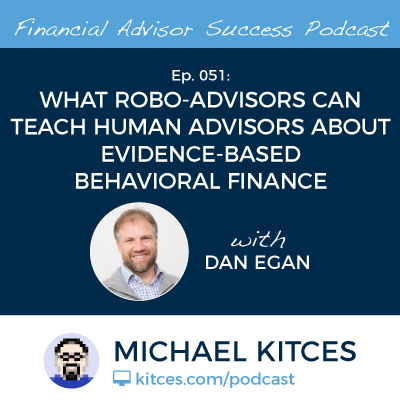Enjoy the current installment of "weekend reading for financial planners" – this week's edition kicks off with the passage of the Tax Cuts and Jobs Act of 2017 (which was formally signed into law by President Trump today), which will brings substantive corporate tax reform, and a slew of tax changes for individuals... many of which impact financial advisors directly, from the potential for a new deduction for pass-through advisory businesses (as long as their income remains below a certain threshold), to the repeal of the deduction for investment advisory fees.
Also in the news this week was the release of the 2nd version of the CFP Board's proposed changes to the Standards of Professional Conduct (which would keep the "fiduciary at all times" rule, but removes the presumption that consumers can even rely on a CFP professional to actually be providing financial planning), a new TD Ameritrade study on breakaway brokers finding that they are increasingly forsaking the idea that broker-dealers will be able to successfully navigate the DoL fiduciary rule (and thus are opting for the RIA channel instead), the latest Fidelity RIA benchmarking study that finds advisory firm growth rates, profit margins, and fees are all under pressure, and a new Investor Bulletin from the SEC warning about hybrid B-D/RIA firms that may be inappropriately using (and/or failing to fully disclose) the costs of their wrap fees.
From there, we have several practice management articles this week, including guidance on why it's so important to find a business focus in the face of declining profit margins for advisory firms, why RIAs need their own "Zillow" platform that can reasonably estimate a true value of the advisory firm in an increasingly unbalanced market of one-time sellers and experienced serial buyers, what advisory firms should be doing now (while times are good) to prepare for the next inevitable bear market (whenever it may occur), and the reasons why Millennials require a fundamentally different approach to engaging financial planners (because they don't need advice on how to manage their accumulated resources... they need help developing policies that will allow them to accumulate those resources in the first place!).
We wrap up with three interesting articles, all around the theme of sexual harassment and diversity issues within our own financial advisory world: the first notes that recent sexual harassment revelations from Morgan Stanley's Harold Ford, and Sallie Krawcheck's #metoo story, may only be the tip of the iceberg in what is still a very male-dominated advisory industry; the second raises the question of whether sexual harassment in advisory firms may be even worse in the small-firm environment (where the harasser may be the boss and founder, and there's no HR department to file a complaint with); and the last looks at how to better have these conversations about diversity and inclusiveness, which can be challenging and awkward even for those who are well-intentioned.
And be certain to scroll down to the end, for a light-hearted video on the ongoing Bitcoin crazy, as the cryptocurrency experiences yet another highly volatile week.
Enjoy the "light" reading, and have a happy holidays!

 Welcome, everyone! Welcome to the 51st episode of the Financial Advisor Success Podcast!
Welcome, everyone! Welcome to the 51st episode of the Financial Advisor Success Podcast! Welcome, everyone! Welcome to the 50th episode of the Financial Advisor Success Podcast!
Welcome, everyone! Welcome to the 50th episode of the Financial Advisor Success Podcast!
